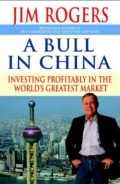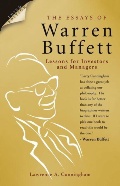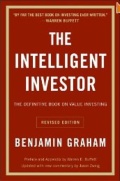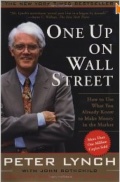| |||||||||||||||||||||||||||||||||||||||||||||||||||||||||||||||||||||||||||
While it is important to invest early, it is more important to invest wisely. In this books review, we present five classic investing books. They can provide indispensable business and finance insights for independent investors - and are highly recommended for new and young investors.
爱丽丝 梦幻世界 i have 2 of this books! a)A Gift to My Children b)The Intelligent Investor (take me 2 years to finish read, haha) 07/05/2012 10:26 PM kltrader I have read the first book but not others. Plan to read them in future.. 07/05/2012 11:50 PM Libra88 The Intelligent Investor ... my investment Bible!!! When the Market is against me, I always go back to this book. If I am with Benjamin, I know I am right. I stay put and let the market roar past. If not I get out! So far so good. 24/06/2012 10:12 PM KC Loh i am not a technical analysis fondie, but its no harm to know how they (or rather the market) thinks in the short term: As potential readers, investors or traders alike, must have a very limited time to read these suggestions, I will keep my recommendations short. Firstly, I understand that there are many skeptics about technical analysis. Most people who read Seeking Alpha are probably of the fundamental type, and hope to seek the chance to capture "CAPM Alpha" or "Multi-Factor Model Alpha" or "Jensen's Alpha" (they have differences in what they stand for). In any case, you believe in that fundamental analysis is the best way to understanding a company, and I agree. However, there are some problems against trading or investing by the sole use of fundamental analysis. Sometimes you may find that the stock you are trading is a very different creature from the company that stands behind it, that you may be frustrated at the fact that even if the company releases a positive unexpected earning in the quarter, its stock just refuses to rise. Or the company's business is relatively stable, yet its stock price is amazingly volatile. All of these doubts may tell you that a stock is different from the company behind it. To trade or invest in stocks, our primary focus is to understand the stock, and then the understanding of the company may aid us later. Have you ever thought about how would you realize a profit in your trade or investment? Let's say a new technology has been developed, and it can cure baldness. Instantly you will find this idea of tremendous value. However, it doesn't mean that this idea will help you immediately profit. We, as individuals, may profit only in one occasion: At first, the majority of the market has a different understanding of the technology/stock/company than we do; in the end, the market converges to our beliefs, and the price converges to our expectations. Therefore, the profit doesn't rely on your viewpoint being accurate, but rather, it relies on the procedure of market misinterpreting it at first, but later collectively realizing that you are right in your special viewpoint. Such things may never happen, or it may be 10 years, 20 years or 30 years until the market finally confirms that you are right, or it may be 10 days or 10 months. In the former occasion, you will have your capital mired in such an investment, a piece of capital you may well wish to put in some other places, and to be put back in this specific stock only when the market shows a signal in its belief of your side of the story. Thus, I believe in the use of all scientific methods in investing or trading stocks, and I believe a combination of fundamental and technical approach is a very good start. Also, changing market conditions, i.e. the development of new technology, may change the method you use. Maybe someday the market is so computerized and the software which employs the technical rules have made the current technical analysis futile in the future. That's perfectly possible. However, right now, I believe that the combination of both approaches is a good way to start. Starting level (If you haven't had any technical analysis exposure yet): First, read Technical Analysis of Stock Trends, 9th edition, by Robert Edwards and John Magee. The book has an exceptionally well organized structure, namely two parts: first, recognizing price patterns, trends, support/resistances, i.e. the technical theory; second, trading tactics in each pattern and trend. The book is great in the sense that it's concise and elegant, both the writing style and the philosophy. It helps you to develop comprehensive idea about stock charts and trading tactics by just looking at the two most "fundamental" things on a chart: price and volume, which is, as a matter of fact, the basis for nearly every technical indicators you will learn in the future. It tells you what mindset to take on when starting to trade, how to protect your profit by avoiding riding on an "elevator" of price swings etc. through concrete examples and rules, instead of blurry words. To be short, it's a Bible accompanied with a multi-million paycheck, if you are able to read it, think about it, and trade by it in depth. Then, read Technical Analysis of the Financial Markets, by John Murphy. After reading the first book, you may feel you have comprehensive understanding of technical analysis in depth, and you are ready to trade. However, it's important to broaden your scope and know about all the new indicators other precursors develop with their years of valuable experience. This book by John Murphy, is such a book that helps you develop such a broadened scope that may prove to be crucial in your later trading. 24/06/2012 11:55 PM KC Loh continue... Other two candidates, as you may have heard of, are Technical Analysis: the Complete Resource for Financial Market Technicians, by Charles Kirkpatrick and Julie Dahlquist and Technical Analysis Explained by Martin Pring. These are truly wonderful books as well, yet with several minor flaws that result in my final recommendation of John Murphy's book. The first book doesn't cover certain topics in depth, and it's more of a welcome edition for people who haven't read Robert Edwards and John Magee. The second book, which explains price actions with more coarse definitions and explanations, (in every price pattern, you want to have an idea about what's the possibility of an exception, 10% or 20%? or what's the extent of Minor Reaction, about 40% or 45% or more? while this book only gives you something like "it's rare" or "it might react quite a margin") is less refined than John Murphy's book, if I venture to say. Therefore, John Murphy's book might well be your second book. Intermediate Level: Now, it's time to delve in depth into the subfields of technical analysis, and I recommend one book for each subfield: Point and Figure: The Definitive Guide to Point and Figure, by Jeremy du Plessis. Japanese Candlestick: Japanese Candlestick Charting Techniques, by Steve Nison. Technical Analysis' Investment Psychology: Investment Psychology Explained, by Martin Pring. Another book, Technical Analysis for the Trading Professional, by Constance Brown is a good book to read after you have some experience in using technical analysis in trading and want to consult on some practical doubts developed during your trading. Having said this much, I have a final suggestion. Don't buy too many books at once. Buy one book, read it through with sufficient time, and continually think over the questions and doubts you have, until you resolve them. Then, only then, you may proceed to another book. I really hope that my recommendations, of however useful degree to you, may help you in the build-up of financial wealth. And I sincerely wish that you may use that wealth wisely, to fulfill your dreams, to pursue your passions, or to build up beneficial projects for the society. 24/06/2012 11:56 PM euclid From what I know, Peter Lynch has written 3 books. What is reviewed here is not 'One Up on Wall Street'. The reviewer got it wrong... 13/07/2012 5:18 PM eyespye Agree with KCLoh on "Technical Analysis: the Complete Resource for Financial Market Technicians, by Charles Kirkpatrick and Julie Dahlquist", I'm reading this now in fact and learning a lot. Learning curve is not too steep and reading and comprehension pretty good. I've bought "Japanese Candlestick: Japanese Candlestick Charting Techniques, by Steve Nison." also a fantastic read (from the first 2 chapters), but I'm putting this aside till I finish the above-mentioned book. For fun and games, I've bought Reminiscence of a Stock Operator by Edwin Lefevre, a great book thought to be an autobiography of the late great Jesse Livermore. Fantastic read. If you can't get enough of Jesse Livermore, read his "How to Trade in Stocks" but read his original 1940 text (you can download it for free - only about 7MB) for some fantastic advice on discipline, restraint and the pivotal point theory. I know people who have read Richard Smitten's treatment of Jesse Livermore's work (Smitten has made a small fortune just writing and re-writing about Livermore... duh) Amazon doesn't have good reviews of Smitten's work. IMPORTANT NOTE: Public service announcement. The books above were purchased from Amazon.com for about USD150.00 which translates to about RM 510 in total. Prices in places like Kino are cut-throat. The Technical Analysis book costs RM 324.00 The Japanese Candlesticks book costs RM 382.00 The Reminiscences book cost(the cheapest version on Kinoweb) is RM 66. The actual cost of those books in Kino are slightly cheaper (saw them 2 weeks ago) but not by much. My point: order from Amazon, wait for the books to arrive, save almost RM 200.00. 14/08/2012 3:58 PM KC Loh thanks eyespye, but sometimes a good second hand book appears in Amazon or Barnes Noble. You can still purchase it at a big discount to the new paperback cost! 14/08/2012 4:00 PM eyespye Agree, I do all my book shopping through Amazon now. If buy through local bookshops dem expensive!!! 14/08/2012 4:02 PM KC Loh I got the John Murphy one, Technical Analysis of the Financial Markets, for USD30 but the darn postage cost me another USD35 :( 14/08/2012 4:02 PM eyespye hehehe.. I've been asking my cousins and friends if they want to "tumpang" to buy books from Amazon.. might as well 1 shipment bring over several more books otherwise keep on paying postage till I'm broke! 14/08/2012 4:08 PM KC Loh oh, if it cost too much for you, try alternatives like scribd.com, free-ebooks.net etc! these are sites for budding writers to come up. Sometimes you never know what you unearth. whether you get classic masterpieces like the ones mentioned above, that you got to find out by yourself. I am an old Amazon fondie! 14/08/2012 4:17 PM Loh Ching Yin Just try to buy a book from amazon,the price totally cheaper than buy anywhere,but(the price really not cheap at all,I mean the book price)hahaha Wait for a month,hehe 17/10/2012 2:55 PM Lt12 by far the intelligent investor was my first investment book...really thought full concept for layman. 20/09/2013 5:14 PM DreamHunter Well, they're okay for a bit of expanding one's outlook. and as a general guide. I'll be looking for them in Kinokuniya, MPH or Borders. Can't get rich from just reading books, though. Mostly it's only good for making the book's author even richer than he already is ... 30/06/2014 10:20 PM DreamHunter They'll look good in one's book cabinet or on one's coffee table, nevertheless. 30/06/2014 10:22 PM yfchong Ok just go to book fair n buy cheaper the intelligent investor 30% discount . The big secret for the small investor by j greenblatt only rm 9.90 value buy 29/07/2014 7:24 PM Raj Raj How to download K.C. chong thesis, financial interpretation yeapmarghee ...pls help with link thx 04/08/2014 10:57 AM wsl5389tee hello guys....i am a new member and hope to learn more from u all.... 04/04/2015 12:01 AM Cl Khong The intelligent investor is a book that every investor should read and own one. Warren shared his life time experience with everybody of how he pick stock and how he make mistake. It is a bible for all investor , if you want to be successful. 25/07/2015 1:19 PM 3EMWE bought 'the intelligent investor' & 'A bull in china' adding more splendid books collection out there waiting to be discover.. happy investing 09/12/2015 10:02 PM Alex Foo Actually I found intelligent investor too overrated. I prefer Fisher's growth investing to Graham's value investing. Even Buffett needed to move on with Mungers help. I recommend a quick read on Common Stock and Uncommon Profit. 31/10/2017 12:22 AM GrahamNewman I digress, Intelligent Investor is still the best book in my opinion, margin of safety is the cornerstone of my investing method. Of course you can get more out of it if you also read Security Analysis. Instructive yet entertaining. Graham had a very artful way of conveying an idea to you. I hope all will get to be better investor. BURSA is too inefficient at the current state! 16/01/2019 4:07 PM AlsvinChangan ALL you need is a good and honest mentor who willing to guide you like Tiger CHAN of JB donkey years ago People like OTB or KYY just take 1 look at the CHART already know the stock can buy or not 10/03/2022 4:10 PM | APPS I3 Messenger Individual or Group chat with anyone on I3investor MQ Trader View Trading Signals and run Live Backtest  MQ Affiliate Earn rewards with MQ Affiliate Program
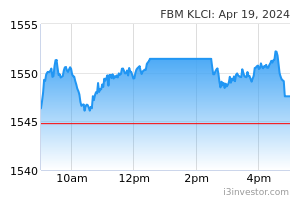 ActiveGainersLosers
| ||||||||||||||||||||||||||||||||||||||||||||||||||||||||||||||||||||||||||
|


